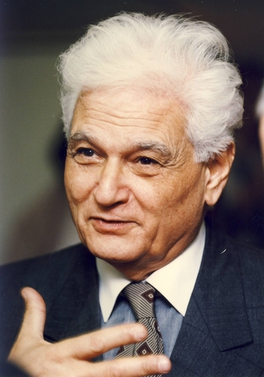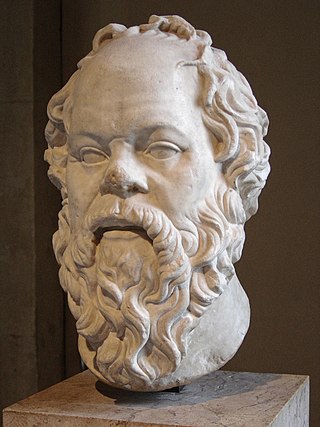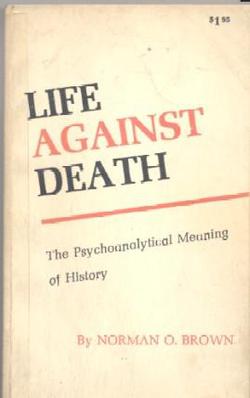
Heraclitus was an ancient Greek pre-Socratic philosopher from the city of Ephesus, which was then part of the Persian Empire. He exerts a wide influence on ancient and modern Western philosophy, through the works of such authors as Plato, Aristotle, Hegel, and Heidegger.

Plato was an ancient Greek philosopher of the Classical period who is considered a foundational thinker in Western philosophy and an innovator of the written dialogue and dialectic forms. He influenced all the major areas of theoretical philosophy and practical philosophy, and was the founder of the Platonic Academy, a philosophical school in Athens where Plato taught the doctrines that would later become known as Platonism.

Jacques Derrida was a French philosopher. He developed the philosophy of deconstruction, which he utilized in a number of his texts, and which was developed through close readings of the linguistics of Ferdinand de Saussure and Husserlian and Heideggerian phenomenology. He is one of the major figures associated with post-structuralism and postmodern philosophy although he distanced himself from post-structuralism and disavowed the word "postmodernity".
Psychoanalytic theory is the theory of personality organization and the dynamics of personality development relating to the practice of psychoanalysis, a clinical method for treating psychopathology. First laid out by Sigmund Freud in the late 19th century, psychoanalytic theory has undergone many refinements since his work. The psychoanalytic theory came to full prominence in the last third of the twentieth century as part of the flow of critical discourse regarding psychological treatments after the 1960s, long after Freud's death in 1939. Freud had ceased his analysis of the brain and his physiological studies and shifted his focus to the study of the psyche, and on treatment using free association and the phenomena of transference. His study emphasized the recognition of childhood events that could influence the mental functioning of adults. His examination of the genetic and then the developmental aspects gave the psychoanalytic theory its characteristics.
Ancient Greek philosophy arose in the 6th century BC. Philosophy was used to make sense of the world using reason. It dealt with a wide variety of subjects, including astronomy, epistemology, mathematics, political philosophy, ethics, metaphysics, ontology, logic, biology, rhetoric and aesthetics. Greek philosophy continued throughout the Hellenistic period and later evolved into Roman philosophy.
Mimesis is a term used in literary criticism and philosophy that carries a wide range of meanings, including imitatio, imitation, nonsensuous similarity, receptivity, representation, mimicry, the act of expression, the act of resembling, and the presentation of the self.

In philosophy, the terms obscurantism and obscurationism identify and describe the anti-intellectual practices of deliberately presenting information in an abstruse and imprecise manner that limits further inquiry and understanding of a subject. The two historical and intellectual denotations of obscurantism are: (1) the deliberate restriction of knowledge — opposition to the dissemination of knowledge; and (2) deliberate obscurity — a recondite style of writing characterized by deliberate vagueness.

Philosophy and literature involves the literary treatment of philosophers and philosophical themes, and the philosophical treatment of issues raised by literature.

Simon Critchley is an English philosopher and the Hans Jonas Professor of Philosophy at the New School for Social Research in New York, USA.

Life Against Death: The Psychoanalytical Meaning of History is a book by the American classicist Norman O. Brown, in which the author offers a radical analysis and critique of the work of Sigmund Freud, tries to provide a theoretical rationale for a nonrepressive civilization, explores parallels between psychoanalysis and Martin Luther's theology, and draws on revolutionary themes in western religious thought, especially the body mysticism of Jakob Böhme and William Blake. It was the result of an interest in psychoanalysis that began when the philosopher Herbert Marcuse suggested to Brown that he should read Freud.

Eros and Civilization: A Philosophical Inquiry into Freud is a book by the German philosopher and social critic Herbert Marcuse, in which the author proposes a non-repressive society, attempts a synthesis of the theories of Karl Marx and Sigmund Freud, and explores the potential of collective memory to be a source of disobedience and revolt and point the way to an alternative future. Its title alludes to Freud's Civilization and Its Discontents (1930). The 1966 edition has an added "political preface".

Beyond the Pleasure Principle is a 1920 essay by Sigmund Freud. It marks a major turning point in the formulation of his drive theory, where Freud had previously attributed self-preservation in human behavior to the drives of Eros and the regulation of libido, governed by the pleasure principle. Revising this as inconclusive, Freud theorized beyond the pleasure principle, newly considering the death drives which refers to the tendency towards destruction and annihilation, often expressed through behaviors such as aggression, repetition compulsion, and self-destructiveness.
In psychology, the psyche is the totality of the human mind, conscious and unconscious. The English word soul is sometimes used synonymously, especially in older texts.
Cratylus was an ancient Athenian philosopher from the mid-late 5th century BC, known mostly through his portrayal in Plato's dialogue Cratylus. He was a radical proponent of Heraclitean philosophy and influenced the young Plato.

Sarah Kofman was a French philosopher.
The B-theory of time, also called the "tenseless theory of time", is one of two positions regarding the temporal ordering of events in the philosophy of time. B-theorists argue that the flow of time is only a subjective illusion of human consciousness, that the past, present, and future are equally real, and that time is tenseless: temporal becoming is not an objective feature of reality. Therefore, there is nothing privileged about the present, ontologically speaking.

Contingency, Irony, and Solidarity is a 1989 book by the American philosopher Richard Rorty, based on two sets of lectures he gave at University College, London, and at Trinity College, Cambridge. In contrast to his earlier work, Philosophy and the Mirror of Nature (1979), Rorty mostly abandons attempts to explain his theories in analytical terms and instead creates an alternate conceptual schema to that of the "Platonists" he rejects. In this schema "truth" is considered unintelligible and meaningless.

The Post Card: From Socrates to Freud and Beyond is a 1980 book by the French philosopher Jacques Derrida. It is a "satire of epistolary literature." After Glas (1974), it is sometimes considered Derrida's most "literary" book, and continues the critical engagement with psychoanalysis first signaled in "Freud and the Scene of Writing" from Derrida's Writing and Difference (1967).
Todd Dufresne is a Canadian social and cultural theorist best known for his work on Sigmund Freud and the history of psychoanalysis. He is Professor of Philosophy at Lakehead University in Thunder Bay, Ontario.












